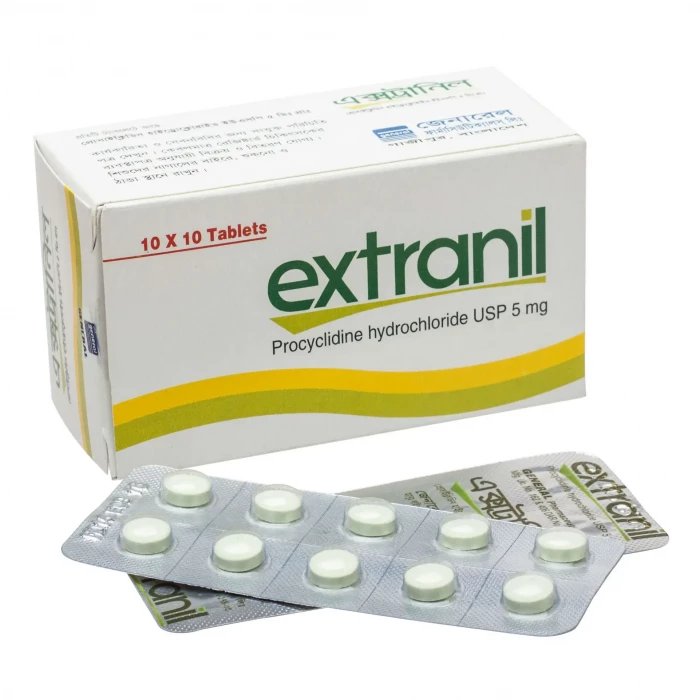
✔ 100% Authentic Product
👁️ Currently Viewing 2977
Cyclid 5mg 10pcs
Generic Name: Procyclidine Hydrochloride 5mg,
Manufacturer: Incepta Pharmaceuticals Ltd.
Discount
Price: ৳ 10
MRP:
৳
10
5%
Off

100% Genuine Products, Guaranteed

Safe & Secure Payments, Always

Fast, Secure & Efficient Delivery

Proper Packaging
 Cash on Delivery - All over Bangladesh
Cash on Delivery - All over Bangladesh Regular Delivery - 12-24 Hours, Dhaka City* Charge Tk.39-59
Regular Delivery - 12-24 Hours, Dhaka City* Charge Tk.39-59 Regular Delivery - 24-48 Hours, Other Cities* Charge Tk.99-110
Regular Delivery - 24-48 Hours, Other Cities* Charge Tk.99-110
 ফ্রি ডেলিভারিঃ - ৯৯৯ টাকা+ অর্ডারে, ঢাকা
শহরে
ফ্রি ডেলিভারিঃ - ৯৯৯ টাকা+ অর্ডারে, ঢাকা
শহরে ফ্রি ডেলিভারিঃ - ২৯৯৯ টাকা+ অর্ডারে, ঢাকার
বাহিরে
ফ্রি ডেলিভারিঃ - ২৯৯৯ টাকা+ অর্ডারে, ঢাকার
বাহিরে
100% Genuine Products, Guaranteed
Safe & Secure Payments, Always
Fast, Secure & Efficient Delivery
Proper Packaging
 Cash on Delivery - All over Bangladesh
Cash on Delivery - All over Bangladesh Regular Delivery - 12-24 Hours, Dhaka City* Charge Tk.39-59
Regular Delivery - 12-24 Hours, Dhaka City* Charge Tk.39-59 Regular Delivery - 24-48 Hours, Other Cities* Charge Tk.99-110
Regular Delivery - 24-48 Hours, Other Cities* Charge Tk.99-110 ফ্রি ডেলিভারিঃ - ৯৯৯ টাকা+ অর্ডারে, ঢাকা
শহরে
ফ্রি ডেলিভারিঃ - ৯৯৯ টাকা+ অর্ডারে, ঢাকা
শহরে ফ্রি ডেলিভারিঃ - ২৯৯৯ টাকা+ অর্ডারে, ঢাকার
বাহিরে
ফ্রি ডেলিভারিঃ - ২৯৯৯ টাকা+ অর্ডারে, ঢাকার
বাহিরে
✅ Description:
Indications
All kinds of the parkinsonian syndrome are treated with procyclidine as an additional medication. It's mostly used to treat idiopathic (paralysis agents), postencephalitic, and arteriosclerotic parkinsonian symptoms. It's used to treat extrapyramidal symptoms like pseudo parkinsonism, acute dystonic responses, and akathisia, which are caused by neuroleptic medications like phenothiazine derivatives.
Pharmacology
Procyclidine hydrochloride is a relatively safe antimuscarinic antiparkinsonian medication. It's a tertiary amine that's been synthesized. The antiparkinsonian action of this medicine is assumed to be achieved by correcting the relative cholinergic excess that occurs in parkinsonians as a result of dopamine deficit. It is quickly absorbed from the GI system and vanishes from the tissues. It takes 5 to 20 minutes after intravenous administration to take effect and might last up to 4 hours.
Dosage & Administration
Tablet: This is administered orally, preferably after meals.
Parkinsonism: Initially 2.5 mg 3 times a day, then 5 mg 3 times a day, and occasionally 5 mg at bedtime. The dosage is adjusted as tolerated or until the total daily dose reaches 20 to 30 mg divided into 3 to 4 doses.
Drug-induced extrapyramidal symptom: Initially 2.5 mg 3 times a day. The dosage is increased by 2.5 mg increment per day as needed and tolerated.
IM or IV injection: 5-10 mg, repeated if necessary after 20 minutes; a maximum of 20 mg daily can be given.
Interaction
The anticholinergic activity of procyclidine may be increased by agents having anticholinergic amantadine. The absorption of ketoconazole may be reduced by the concomitant administration of procyclidine.
Contraindications
In youngsters and the elderly, it should be used with caution. Patients with diarrhea, cardiovascular illness, glaucoma, urinary retention, and hepatic or renal impairment should be given Procyclidine with caution. Procyclidine's safety during pregnancy has yet to be determined. There are no data on this drug's excretion in breast milk.
Side Effects
Dryness of the mouth is usually the only side effect at standard dosage levels. Mydriasis, impaired vision, and gastrointestinal side effects (nausea, vomiting, epigastric discomfort, constipation) are all possible side effects. An allergic reaction (such as a rash) or muscle weakness may develop on rare occasions. In high doses, vertigo, confusion, and delusion are possible side effects. Adverse effects are usually reduced by adjusting the dosage and administering the medication after a meal.
Pregnancy & Lactation
In order to take this medicine safely during pregnancy, lactation, or in women of reproductive age, the potential advantages must be evaluated against the potential risks to the mother and child.
Precautions & Warnings
In the case of hepatic and renal impairment, children, the elderly, pregnancy, and lactation, caution should be exercised. When Procyclidine is used to treat the extrapyramidal side effects of neuroleptics, it can sometimes precipitate a psychotic episode in patients with mental problems. Rebound Parkinsonism symptoms may arise if procyclidine is abruptly stopped.
Storage Conditions
Keep the temperature below 30°C and away from light and moisture. Keep out of children's reach.
⚠️Disclaimer:
At ePharma, we’re committed to providing accurate and accessible health information. However, all content is intended for informational purposes only and should not replace medical advice from a qualified physician. Please consult your healthcare provider for personalized guidance. We aim to support, not substitute, the doctor-patient relationship.












